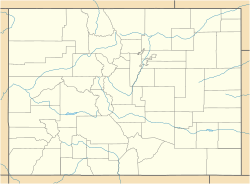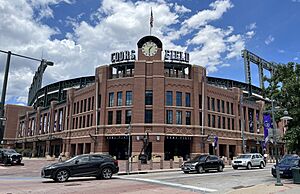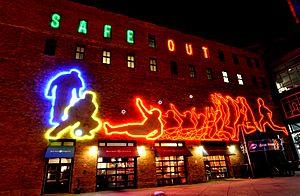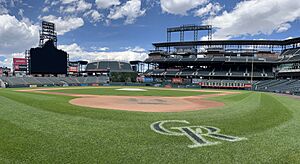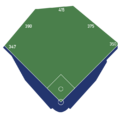Coors Field facts for kids
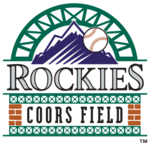 |
|
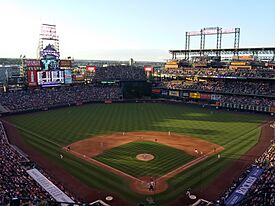
Coors Field in 2015
|
|
| Address | 2001 Blake Street |
|---|---|
| Location | Denver, Colorado, United States |
| Coordinates | 39°45′22″N 104°59′39″W / 39.75611°N 104.99417°W |
| Public transit | RTD: at Denver Union Station |
| Operator | Colorado Rockies Baseball Club Ltd. |
| Capacity | 46,897 (50,144 with standing room) (2018–present) 50,398 (2012–2017) 50,490 (2011) 50,445 (2001–2010) 50,381 (1999–2000) 50,200 (1995–1998) |
| Record attendance | 51,267 (1998 MLB All-Star Game) |
| Field size | Left Field – 347 feet (106 m) Left-Center – 390 feet (119 m) Center Field – 415 feet (126 m) Right-Center – 375 feet (114 m) Right Field – 350 feet (107 m) Backstop – 56 feet (17 m) 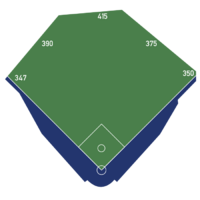 |
| Surface | Kentucky Bluegrass/Perennial Ryegrass |
| Construction | |
| Broke ground | October 16, 1992 |
| Opened | April 26, 1995 |
| Construction cost | US$300 million ($576 million in 2022 dollars ) |
| Architect | HOK Sport (now Populous) |
| Project manager | CMTS, Inc. |
| Structural engineer | Martin/Martin, Inc. |
| Services engineer | M-E Engineers, Inc. |
| General contractor | Mortenson/Barton Malow |
| Main contractors | LPR Construction Havens Steel Zimmerman Metals Zimkor Industries LPR Erectors |
| Tenants | |
| Colorado Rockies (MLB) (1995–present) | |
Coors Field is a famous baseball stadium located in downtown Denver, Colorado. It is the home field for the Colorado Rockies, a team in Major League Baseball. The stadium opened in 1995 and is a popular spot in Denver's Lower Downtown area.
Coors Field can hold over 50,000 fans for baseball games. It's known for its high elevation, which makes baseballs fly farther. To balance this, the outfield fences are quite far from home plate. The stadium has hosted two MLB All-Star Games and even an outdoor hockey game. It also hosts many concerts.
Contents
Building Coors Field: A New Home for Baseball
Coors Field was one of the first new sports venues built in Denver during the 1990s. It was special because it was the first stadium built just for baseball in the National League since 1962. The stadium was designed to be easy to get to, with nearby highways and public transportation like light rail and buses.
Why the Stadium Got Bigger
When the Colorado Rockies first started playing in 1993, they played at Mile High Stadium. They were so popular that almost 4.5 million people came to their games in their first season! Because of this huge fan support, the plans for Coors Field were changed during construction. More seats were added in the right field area, making the stadium even bigger.
The Rockpile and Dinosaur Discoveries
A special seating area in center field is called "The Rockpile." These seats are high up and far from home plate. When the stadium was being built, workers found small dinosaur fossils. This led to the idea of naming the stadium "Jurassic Park" for a short time. It also inspired the Rockies' mascot, Dinger, who is a triceratops.
The Name: Coors Field
The stadium is named Coors Field because Coors Brewing invested a lot of money in the Rockies team in 1991. They bought the naming rights, meaning the stadium would keep the "Coors Field" name for a very long time.
Cool Features of Coors Field
Coors Field has some unique features that make it stand out.
Purple Seats and High Elevation
Most of the seats in Coors Field are dark green. But if you look closely, you'll see a row of purple seats in the upper deck. These purple seats are in the 20th row. They mark the exact spot where the stadium is one mile (5,280 feet) above sea level. It's a cool way to show how high up Denver is!
The Blue Moon Brewery
Behind the right-field stands, there's a special place called "The Blue Moon Brewery at The Sandlot." It's a small brewery and restaurant run by the Coors Brewing Company. They experiment with different craft beers there. The famous Blue Moon beer was actually invented at this very spot!
Rocky Mountain Scenery
Beyond the center field wall, you'll find a beautiful landscape that looks like the Rocky Mountains. It has a waterfall, fountains, and pine trees. When the Rockies hit a home run or win a game, these fountains shoot water high into the air, which is a fun sight for fans.
Big Screens and Party Decks
The park has huge LED video screens in the outfield. These screens show lineups, player statistics, and the scoreboard. There are also long ribbon displays around the field. In 2014, a part of the upper deck in right field was turned into an outdoor party area called "The Rooftop."
Why Coors Field is a Hitter's Paradise
Coors Field is famous for being a "hitter-friendly" park. This means that batters tend to hit more home runs and get more hits there.
The Effect of High Altitude
Denver is very high above sea level, much higher than most other baseball stadiums. The air here is thinner, which means there's less air resistance. When a baseball is hit, it travels farther through the thin air. This is why many more home runs were hit at Coors Field in its early years.
Solving the Home Run Problem: The Humidor
To make the game fairer, the Rockies made some changes. First, they moved the outfield fences farther back from home plate. This created one of the largest outfields in Major League Baseball.
Later, in 2002, they added a special room called a "humidor." This room stores the baseballs in damper (more humid) air before games. Baseballs stored in humid air become a little softer. This makes them less bouncy when hit by a bat, so they don't fly quite as far. Since the humidor was installed, the number of home runs at Coors Field has become more similar to other stadiums.
Challenges for Pitchers
Even with the humidor, the high elevation still affects the game. Baseballs still travel a bit easier through the thin air. Also, curveballs, which are tricky pitches, don't curve as much in the thin air. This can make it harder for pitchers to get batters out.
Memorable Moments at Coors Field
Coors Field has seen many exciting moments in its history.
Famous Baseball Games
- In 1996, Hideo Nomo of the Los Angeles Dodgers threw a "no-hitter" game at Coors Field. This was very impressive because Coors Field is known for being a place where batters usually do well.
- Coors Field hosted the 1998 Major League Baseball All-Star Game and the 2021 Major League Baseball All-Star Game. These are special games where the best players from different teams come together.
- In 2007, Coors Field hosted Games 3 and 4 of the 2007 World Series.
- On August 7, 2016, baseball legend Ichiro Suzuki got his 3,000th career MLB hit at Coors Field. It was a triple that hit the right field wall!
Coldest Game Ever
On April 23, 2013, the Rockies and the Braves played in the coldest MLB game since 1991. The temperature was a chilly 23 degrees Fahrenheit (about -5 degrees Celsius)!
1-0 Games
Even though Coors Field is known for lots of scoring, there have been eleven games where the final score was 1-0. All of these low-scoring games happened after the humidor was installed, showing how it changed the way games are played.
Concerts and Hockey Games
Coors Field isn't just for baseball! It has also hosted many big concerts with famous artists like Zac Brown Band, Eagles, Journey, Billy Joel, and Green Day.
In February 2016, the stadium was turned into an ice rink for three outdoor hockey games. The Colorado Avalanche played against the Detroit Red Wings in an NHL Stadium Series game.
Banana Ball is Coming!
In August 2025, the popular Savannah Bananas baseball team will play two games of their unique "Banana Ball" at Coors Field. Tickets for these fun games sold out very quickly!
The Voice of Coors Field
Alan Roach was the main public address (PA) announcer for Coors Field from when it opened in 1995. He is also known for being the PA announcer for the Colorado Avalanche hockey team and has even announced at Super Bowls. He is also one of the voices you hear on the train system at Denver International Airport.
Firsts at Coors Field
Here are some of the very first things that happened at Coors Field on its opening day and in the days that followed:
Opening Day (April 26, 1995)
| What Happened | Who Did It |
| Final Score | Colorado 11, New York Mets 9 14 innings |
|---|---|
| First National Anthem | Colorado Children's Chorale |
| First Pitch | 5:38 p.m., Bill Swift to Brett Butler |
| First Hit | Brett Butler, infield single, 1st inning |
| First Run | Walt Weiss (Rockies), 1st inning |
| First Home Run | Rico Brogna (Mets), 4th inning off Swift |
| First Grand Slam | Todd Hundley (Mets), 6th inning off Swift |
| First Walk-off Home Run (and First Rockies Home Run) | Dante Bichette (Rockies), three-run home run, 14th inning |
| First Win | Mark Thompson (Rockies) |
Later Firsts
| What Happened | Who Did It | When |
|---|---|---|
| First Stolen Base | Eric Young and Walt Weiss (Rockies) double steal | April 27, 1995 |
| First Triple | Andrés Galarraga (Rockies) | April 27, 1995 |
| First Save | Bruce Ruffin (Rockies) | May 3, 1995 |
| First Complete Game and First Shutout | Tom Glavine (Atlanta Braves) | June 16, 1995 |
| First Cycle (hitting a single, double, triple, and home run in one game) | John Mabry (St. Louis Cardinals) | May 18, 1996 |
| First No-hitter | Hideo Nomo (Los Angeles Dodgers) | September 17, 1996 |
| First Unassisted Triple Play (one player gets three outs by themselves) | Troy Tulowitzki (Rockies) | April 29, 2007 |
Images for kids
See also
 In Spanish: Coors Field para niños
In Spanish: Coors Field para niños
 | William L. Dawson |
 | W. E. B. Du Bois |
 | Harry Belafonte |


